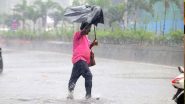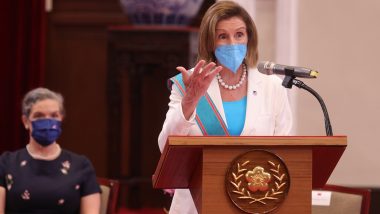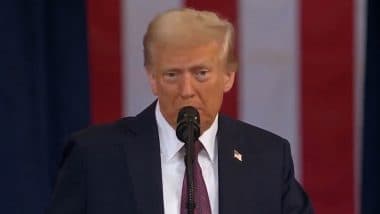Taipei/Beijing: US House Speaker Nancy Pelosi on Wednesday pledged Washington's support for Taiwan during a visit to the island that has drawn Beijing's ire.
"Today, our delegation... came to Taiwan to make unequivocally clear: we will not abandon our commitment to Taiwan, and we're proud of our enduring friendship," Pelosi said at a joint press conference with Taiwan's President Tsai Ing-wen.
"Today, the world faces a choice between democracy and autocracy," Pelosi said, as she praised Taiwan as "one of the freest [democracies] in the world, proudly to be led by a woman president."
"Now more than ever, America solidarity with Taiwan is crucial. And that is the message we are bringing here today," dpa news agency reported quoting Pelosi.
Tsai said Russia's invasion of Ukraine has highlighted security concerns about Taiwan.
"Aggressions against a democratic Taiwan would have a tremendous impact on the security of the entire Indo-Pacific," she warned.
"Facing deliberately heightened military threats, Taiwan will not back down. We will firmly uphold our nation's sovereignty and continue to hold the line of defence for democracy," Tsai said, adding "We will do whatever it takes to strengthen Taiwan's self-defence capability."
Pelosi arrived in Taiwan on Tuesday despite stern warnings from Beijing, making her the highest-level US official to visit the island in 25 years.
The trip has drawn outrage from Beijing, which views the self-governing island as part of the People's Republic and rejects official contacts between its diplomatic partners and the government in Taipei. US House Speaker Nancy Pelosi Meets Taiwanese President Tsai Ing-wen (Watch Video).
In response to her arrival, China launched military exercises in six areas in the waters surrounding Taiwan. They are expected to include long-range live-fire exercises and last through Sunday.
The manoeuvres are seen as the biggest show of military muscle from Beijing since the 1995 Taiwan Strait crisis, when China fired missiles over Taiwan and the US dispatched two aircraft carrier groups.
The Chinese Foreign Ministry summoned the US ambassador to China, Nicholas Burns, early Wednesday to protest Pelosi's visit as a "serious provocation and violation" of the one-China principle, state newspaper Global Times reported.
China also sent 21 planes into Taiwan's air defence identification zone on Tuesday alone, the Defence Ministry in Taipei said.
US National Security Council spokesperson John Kirby on Tuesday said that Washington was expecting that China would "continue to react over a longer-term horizon ... even beyond [Pelosi's] trip."
Kirby, who stressed that Pelosi's visit was "totally consistent with our long-standing 'One China' policy," said that China's reaction was "unfortunately, right in line with what we had anticipated."
"There is no reason... for Beijing to turn this visit, which is consistent with long-standing US policy, into some sort of crisis, or use it as a pretext to increase aggressiveness and military activity in or around the Taiwan Strait, now or beyond her travel," Kirby said during a press briefing in Washington.
"We are prepared to manage what Beijing chooses to do," he went on. "We will not engage in sabre-rattling," he said.
For days, Pelosi had declined to confirm news reports that she would visit and Taiwan was not on her official itinerary.
An editorial by Pelosi was published in the Washington Post minutes after she arrived in Taipei.
"We cannot stand by as the CCP (the Chinese Communist Party) proceeds to threaten Taiwan - and democracy itself," she wrote.
"Indeed, we take this trip at a time when the world faces a choice between autocracy and democracy. As Russia wages its premeditated, illegal war against Ukraine, killing thousands of innocents - even children - it is essential that America and our allies make clear that we never give in to autocrats."
"By travelling to Taiwan, we honour our commitment to democracy: reaffirming that the freedoms of Taiwan - and all democracies - must be respected," Pelosi wrote.
Taiwan, which has 23 million inhabitants, has long considered itself independent.
The Russian invasion of Ukraine has heightened fears that China could annex the democratic island republic by force. Tensions over Taiwan have not been as high since the 1990s.
(The above story first appeared on LatestLY on Aug 03, 2022 03:38 PM IST. For more news and updates on politics, world, sports, entertainment and lifestyle, log on to our website latestly.com).













 Quickly
Quickly




















